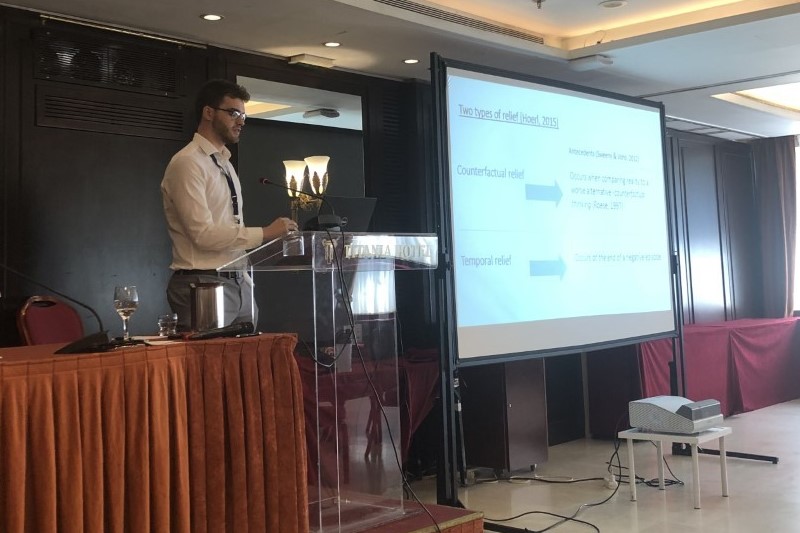Matthew Johnston
My project is funded by The Leverhulme Trust.
What is your ideal Research outcome?
Although regret is well-understood, there is currently no comprehensive psychological theory of relief. My aim is to add to the dearth of research into the development of relief and to explore whether the two instances of relief emerge at separate ages. Moreover, I hope to shed light onto the function of relief. Previous research has investigated the behavioural consequences of regret and such research has been used to inform interventions on real-life decisions. An ideal outcome of my project is that the research I carry out can help to provide a theoretical framework which can scaffold the production of real-life interventions.
Supervisors
Professor Aidan Feeney and Professor Teresa McCormack
Why did you choose this PhD and why at Queen's?
Although I found most areas of psychology interesting in my undergraduate degree, I was particularly fascinated with the development of complex thinking skills that underlie our everyday activities. My PhD project intrigued me as there is (or rather there was) a real lack of understanding into the emotion of relief, in particular with its development and behavioural functions. The project posed interesting questions that were novel and important. I also liked the challenge of designing child-friendly versions of tasks that had been created for adults.
I enjoyed my undergraduate degree at Queen’s and wanted to continue my studies here because I found the project so interesting and the developmental lab consisted of prominent scholars who I knew would be great supervisors.
How have you been supported at Queen's?
I have been given many opportunities to practice my communication skills. I have spoken at the annual PGR seminar, a workshop titled, “Thinking about the possible” and at four different international conferences (including a presentation in Athens!). There are weekly seminars so students can get to meet with the research staff and see what other research is going on in the school. Also, there are journal clubs to join which allow you to discuss niche research papers with fellow students and staff members.
The annual PsychHike is also a great initiative that allows first year PG students to practice their presentations for differentiation in a safe environment before going out for drinks and a long hike the following day.
In what ways have you developed at Queen's?
My confidence and ability to tackle problems in innovative ways have really improved over the course of my PhD. Moreover, I am a much more competent communicator both in my writing and presentations.
Can you describe the postgraduate community in the School and at Queen's?
Before the pandemic, the PhD office was a friendly, sociable environment and you could always have fun at lunch either talking nonsense or discussing complicated research problems and issues. People are always friendly and willing to help if you ask. The weekly seminars were a good way to get to know the staff members and there are plenty of opportunities to network (and get a free lunch).
Where do you hope your PhD will lead?
I really enjoy problem solving and tackling with complex intellectual material so I would be interested in continuing research and would hope to obtain a post-doc / research fellow job after my PhD. I also really enjoy teaching and would one day hope to obtain a lectureship.
Anything else you would like to add or advise to new PGR students?
Come into the office as much as you can (when we are allowed to again). It will give you a chance to meet others who are in the same boat and you can complain about PhD life together. Remember that everyone goes through spells of imposter syndrome throughout their PhD (and after). Be kind to yourself, don’t be afraid to ask questions and take time off your work every so often.
Connect with Matthew on the following platforms:

